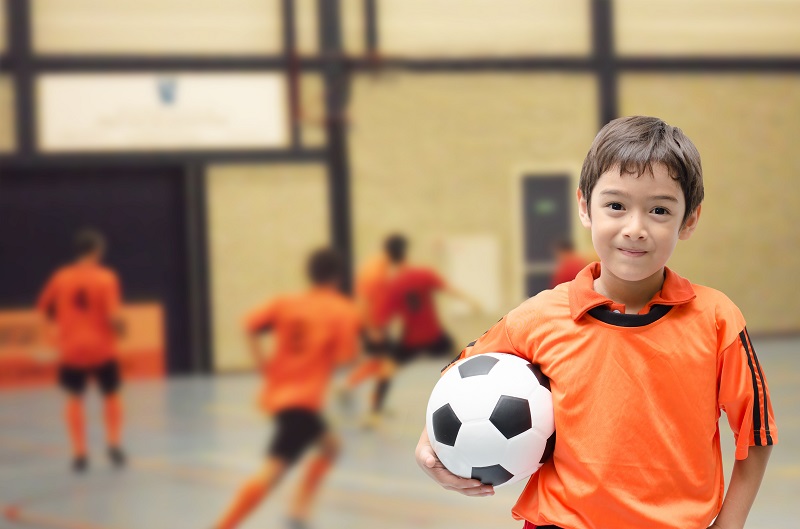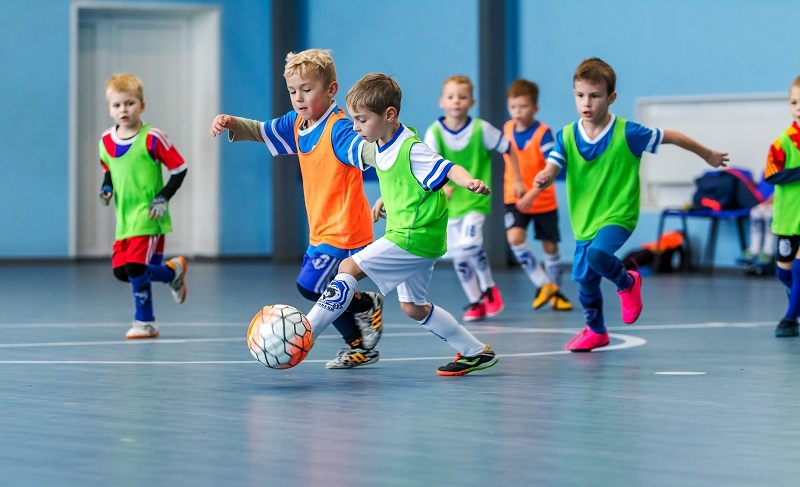
Are you searching for a sport that can accelerate your child’s growth? There is no substitute for futsal! This fast-paced indoor game can enhance your child’s talents on and off the pitch in a variety of ways. Futsal offers a dynamic and challenging environment for young players, from enhancing technical skills to fostering game intelligence and cooperation. With its smaller field, distinct ball control requirements, and intense gameplay, futsal challenges players to their limits and aids in the development of crucial skills. Continue reading to discover how futsal can unleash your child’s full potential.
An Overview of the Benefits of Futsal in Children
Young participants derive numerous benefits from futsal, making it an ideal sport for their overall development.
- Futsal’s fast-paced and skill-intensive nature offers young athletes a unique opportunity to develop their physical, technical, and cognitive skills.
- Young players have the opportunity to learn and develop new abilities in an indoor environment, which is one of the sport’s most significant advantages.
- Unlike outdoor football, futsal instructors are able to create easily-displayed learning objectives and session plans. This enables players to comprehend the focus areas and encourages them to actively partake in their own development.
- The controlled indoor environment of the football turf in Chennai (https://www.dugoutchennai.com/futsal/) eliminates weather-related obstacles, guaranteeing consistent and uninterrupted training sessions.
- The enhanced ball control provided by futsal is another greatest advantage of the sport.
- In regular football, players frequently receive the ball with the sole of their foot, which enables them to manipulate it rapidly without losing momentum. The smaller, less bouncy ball used in futsal makes it simpler for young players to develop and master this skill.
- The smaller size and lighter weight of the ball enable players to improve their close ball control, agility, and direction changes, resulting in enhanced performance on the field.
- Futsal also aids in the formation of intelligent defenders. Due to the nature of the game, defenders must exhibit patience, dexterity, and sound judgment.
- Controlled possession of the ball and the limitation of fouls encourage defenders to concentrate on strategic positioning.
- Futsal helps develop defensive intelligence, spatial awareness, and the ability to effectively analyze the game.
- Futsal provides kids with an excellent introduction to indoor play.
- The smaller pitch, lack of barriers, and use of a smaller and heavier ball pose unique challenges that require technical proficiency and swift decision-making.
- Futsal contributes to the development of technical, physical, and social abilities.
- Young futsal players have precise ball control, quick transitions, and continuous participation, thereby laying the foundation for a successful football career.
Futsal’s Unique Nature Enhances the Skills of Young Players. How
Futsal strongly emphasizes technical skills and game intelligence, making it an excellent option for youthful player development. In this fast-paced indoor sport, players must continuously control the ball, make prompt decisions, and execute accurate passes and shots. Consequently, futsal improves your child’s technical skills and overall game intelligence.
Ball control is a crucial component of futsal. The smaller and bulkier futsal ball demands a high level of control and mastery from players. Due to the limited court space, players must deftly maneuver the ball through tight spaces. This constant demand for ball control sharpens their dribbling, passing, and receiving skills, allowing them to gain comfort and confidence with the ball at their feet.
Futsal encourages the development of passing and movement abilities. In contrast to traditional football, where players frequently have more time and space to make decisions, futsal requires players to consider and act quickly. They must anticipate their colleagues’ movements, make accurate and timely passes, and generate scoring opportunities. This improves their ability to interpret the game, make split-second decisions, and develop a solid grasp of team dynamics.
In addition to developing technical abilities, futsal cultivates young players’ game intelligence. The smaller playing field and constant participation in the game require players to be aware of their surroundings, evaluate the positions of allies and opponents, and make strategic decisions. Futsal players must continuously adapt to altering situations and identify defensive weaknesses. This enhanced game intelligence results in enhanced decision-making skills, spatial awareness, and a deeper comprehension of tactics and strategies.
Young futsal players are introduced to a variety of game systems and formations. Players learn to operate within a variety of tactical structures, including the well-known 1-2-1, 2-2, 3-1, and 4-0 formations. By comprehending and implementing these systems, players gain a deeper understanding of positional play, off-the-ball movement, and effective team coordination. The tactical foundations developed in futsal can be transferred to other forms of football, providing players with a firm tactical foundation as they advance in their athletic careers. India is witnessing a gradual surge in international futsal arena in recent years. Find out more.

Elaborating on the Positive Impact of Futsal Goalkeeping on Kids
The futsal goalkeeper plays a crucial position in the game, making them an integral part of the team’s success. Futsal goalkeepers are continuously active and play an important role in the game’s defensive and offensive aspects. Due to the limited playing area, the goalkeeper in a futsal game is significantly more involved in futsal. They must be vigilant because the ball is always in movement. This level of participation gives young goalkeepers a lot of opportunities to develop their abilities and acquire valuable match experience.
A futsal goalkeeper must have exceptional ball control abilities. The ability to swiftly and accurately pass the ball is vital for initiating counterattacks. The goalkeeper’s kickoff is a crucial offensive tool, enabling the team to quickly transition from defense to offense. By mastering these skills, young goalkeepers can significantly contribute to their team’s overall strategy and success.
The goalkeepers play an important role in organizing the defense and ensuring effective communication with their colleagues from a strategic standpoint. With only four outfield players, the positioning and instructions of the futsal goalkeeper become even more crucial. They serve as the team’s eyes from behind, constantly assessing the game situation and guiding their fellow players. Maintaining a solid defensive structure and preventing scoring opportunities for the opposition requires the goalkeeper’s tactical awareness and ability to interpret the game.
Additionally, the futsal goalkeeper mostly takes the role of a team leader. They become natural leaders on the pitch due to their comprehensive understanding of the game. They direct their colleagues and inspire the group, fostering a cohesive and well-organized unit. This responsibility contributes to their growth as players by instilling qualities such as leadership, communication, and collaboration.
Last words
Futsal is more than just a game for children; it is a gateway to their holistic development. The numerous benefits of futsal, such as improved technical skills, tactical intelligence, physical fitness, and mental acuity, make it an invaluable choice for young players. Futsal’s smaller pitch and faster pace create an environment that demands quick thinking, adaptability, and teamwork. By embracing futsal, children enhance their soccer abilities and cultivate important life skills that extend far beyond the playing field. So, let’s empower our children with the incredible benefits of futsal and watch them grow into confident, skilled, and well-rounded individuals.


